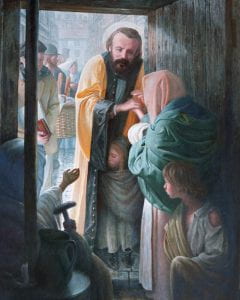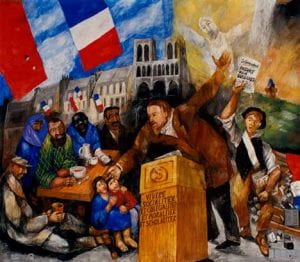 Each year on September 9th, the worldwide Vincentian family celebrates the Feast Day of Blessed Frédéric Ozanam (1813-1853), the nineteenth-century French, lay Catholic leader, widely considered the founder of the Society of St. Vincent de Paul. The Society is now an international confederation present in 150 countries with over 800,000 members in 47,000 Conferences and 1.5 million volunteers and collaborators. It serves the needs of over 30 million people all over the world.
Each year on September 9th, the worldwide Vincentian family celebrates the Feast Day of Blessed Frédéric Ozanam (1813-1853), the nineteenth-century French, lay Catholic leader, widely considered the founder of the Society of St. Vincent de Paul. The Society is now an international confederation present in 150 countries with over 800,000 members in 47,000 Conferences and 1.5 million volunteers and collaborators. It serves the needs of over 30 million people all over the world.

Ozanam was a French literary scholar, lawyer, journalist, and equal rights advocate in Paris. He was recognized as a skilled writer, orator, thinker, social activist, and model of faith oriented toward outward action. Following the practices of Saint Vincent de Paul and inspired by his faith, Ozanam served the poor and destitute of Paris. He especially saw the power of bringing students together to study Vincentian principles and engage with those who were marginalized and poor.
While a student of law and literature in Paris, he founded the Society in 1833 with a group of friends who gathered regularly to grow in their faith and visit the poor. With the help of the older Emmanuel Bailly, who brought his own experience of socially engaged Catholicism, they provided vouchers for bread and wood to those in need. Inspired by the gospel message of love, they provided instruction and gave of their time and presence to serve the disadvantaged.
 Later, as a professor at the prestigious Sorbonne, Ozanam became a renowned scholar and intellectual. He dedicated his life to understanding what Catholicism offered civilization. Committed to the principles of democracy and social justice, he became a journalist at L’Ère Nouvelle (The New Era), advocating for social reform and a governmental regime of liberty, equality, and fraternity that included the less fortunate. Frédéric was also devoted to his wife, Amélie, and their daughter Marie, whom he loved dearly. His integration of his professional life with his personal and spiritual life, along with his simple yet open style of engagement offers us a model of servant leadership today. Frédéric Ozanam was beatified by Pope John Paul II during World Youth Day in 1997.
Later, as a professor at the prestigious Sorbonne, Ozanam became a renowned scholar and intellectual. He dedicated his life to understanding what Catholicism offered civilization. Committed to the principles of democracy and social justice, he became a journalist at L’Ère Nouvelle (The New Era), advocating for social reform and a governmental regime of liberty, equality, and fraternity that included the less fortunate. Frédéric was also devoted to his wife, Amélie, and their daughter Marie, whom he loved dearly. His integration of his professional life with his personal and spiritual life, along with his simple yet open style of engagement offers us a model of servant leadership today. Frédéric Ozanam was beatified by Pope John Paul II during World Youth Day in 1997.
In the summer of 2020, DePaul University renamed one of its residence halls in his honor.
To learn more about Frédéric’s legacy and his contributions to understanding our shared Vincentian mission, explore some of the following Vincentian Heritage resources:
Blog Reflections:
- Connecting Charity with Justice
- Changing Attitudes and Changing Structures: Walking with Frederic Ozanam
Podcasts:
- Frédéric Ozanam: Systemic Thinking, and Systemic Change
- Frederic Ozanam’s Tactical Wisdom for Today’s Consumer Society
- The Virtuous Personality of Blessed Frederic Ozanam
- To the Society of St. Vincent DePaul, Emulating Vincent
Articles featured in the Vincentian Heritage Journal:
- “Pioneer and Prophet: Frédéric Ozanam’s Influence on Modern Catholic Social Theory,” by Thomas W. O’Brien: https://via.library.depaul.edu/vhj/vol31/iss1/1/
- “Faith, Charity, Justice, and Civic Learning: The Lessons and Legacy of Frédéric Ozanam,” by Raymond Sickinger, Ph.D.: https://via.library.depaul.edu/vhj/vol30/iss1/5/
- “Frédéric Ozanam―Beneficent Deserter: Mediating the Chasm of Income Inequality through Liberty, Equality, and Fraternity,” by Rev. Craig Mousin: https://via.library.depaul.edu/vhj/vol30/iss1/4/
- “Frédéric Ozanam, Catholic Student (1831–1836),” by Jean-Claude Caron: https://via.library.depaul.edu/vhj/vol30/iss1/2/
- “Frédéric Ozanam: Systemic Thinking, and Systemic Change,” by Raymond Sickinger, Ph.D.: https://via.library.depaul.edu/vhj/vol32/iss1/4/
- “What Would Ozanam Do?,” by David L. Gregory: https://via.library.depaul.edu/vhj/vol30/iss1/3/
- “Canonization of Frederick Ozanam: History of the Cause,” by William W. Sheldon C.M.: https://via.library.depaul.edu/vhj/vol17/iss1/5/
- “The Virtuous Personality of Blessed Frederick Ozanam,” by John E. Rybolt, C.M.: https://via.library.depaul.edu/vhj/vol17/iss1/3/
- “Frederick Ozanam: Lay Evangelizer,” by Shaun McCarty, S.T.: https://via.library.depaul.edu/vhj/vol17/iss1/2/
- “The Vincentian Charism in the Laity: Frederick Ozanam,” by Ambrosio R. Carranza: https://via.library.depaul.edu/vhj/vol7/iss1/3/
- “Frédérick Ozanam, A Layman For Now,” by Frederick J. Easterly C.M.: https://via.library.depaul.edu/vhj/vol4/iss2/4/
- “Frédéric Ozanam’s Tactical Wisdom for Today’s Consumer Society,” by Thomas McKenna, C.M.: https://via.library.depaul.edu/vhj/vol30/iss1/1/
- “The Most Important Question,” by Rev. Craig Mousin: https://via.library.depaul.edu/vhj/vol28/iss2/3/